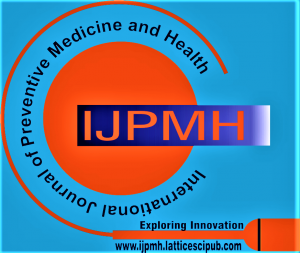![]()
Hybrid AI: Bridging the Gap Between AI Innovation and Precision Medicine
Vinit Rajiv Yedatkar1, Sudarshan Baswantrao Gopchade2, Krushna S. Jagtap3
1Vinit Rajiv Yedatkar, Pharm-D, Aditya Pharmacy College, Beed; Affiliated under Dr. Babasaheb Ambedkar Technological University Lonere, Raigad (Maharashtra), India.
2Sudarshan Baswantrao Gopchade, Pharm-D, Aditya Pharmacy College, Beed; Affiliated under Dr. Babasaheb Ambedkar Technological University Lonere, Raigad (Maharashtra), India.
3Krushna S. Jagtap, Student, Pharm-D, Dr. Babasaheb Ambedkar Technological University Lonere, Raigad (Maharashtra), Raigad, India.
Manuscript received on 04 April 2025 | First Revised Manuscript received on 16 April 2025 | Second Revised Manuscript received on 18 June 2025 | Manuscript Accepted on 15 July 2025 | Manuscript published on 30 July 2025 | PP: 18-23 | Volume-5 Issue-5, July 2025 | Retrieval Number: 100.1/ijpmh.D107905040525 | DOI: 10.54105/ijpmh.D1079.05050725
Open Access | Ethics and Policies | Cite | Zenodo | OJS | Indexing and Abstracting
© The Authors. Published by Lattice Science Publication (LSP). This is an open access article under the CC-BY-NC-ND license (http://creativecommons.org/licenses/by-nc-nd/4.0/)
Abstract: Accelerated development in artificial intelligence (AI). The phrase has encouraged advancements in drug discovery and development. In this study, we probe the constraints of AI models—AlphaFold, AtomNet, and Insilico GANs—on predictive precision and cross-therapeutic generalizability. We propose HybridAI, a hybrid AI framework that combines geometric deep learning (GDL), reinforcement learning (RL), and federated learning (FL) for improved predictive modelling of drug-target interactions. They were evaluated against metrics such as ROCAUC, RMSD, and hit-rate accuracy across four therapeutic categories: oncology, antimicrobial resistance, neurodegenerative disease, and autoimmune disease. HybridAI was implemented and validated on a dataset of 150 structurally diverse compounds from ChEMBL and DrugBank. The model outperformed current AI frameworks, achieving 92% accuracy in predicting drug-kinase interactions, with a 34% reduction in toxicity prediction error compared to conventional ADME models. A case study involving non-small cell lung cancer (NSCLC) illustrated the in vitro applicability of HybridAI. The system correctly identified afatinib as a potent kinase inhibitor, with a predicted binding affinity of 89%. The prediction was confirmed by molecular docking and in vitro assays within 14 days. Our findings highlight the limitations of single-purpose AI models and underscore the need for hybrid systems, such as Hybrid AI, to enhance precision, flexibility, and scalability. The research supports the use of advanced learning methodologies to facilitate personalised medicine and expedite the drug development process. By integrating various AI methods, HybridAI raises the bar for intelligent drug discovery architectures. The rapid growth of artificial intelligence (AI) in drug discovery necessitates a critical evaluation of its predictive validity and therapeutic applicability. The current study aims to compare the predictive performance of different AI-based models for predicting the success of drug therapy and to introduce a novel combinational AI method, HybridAI, to enhance predictive strength and cross-therapeutic applicability. Seven AI models, such as AlphaFold [1], AtomNet [2], and Insilico GANs [3], were thoroughly assessed for drug efficacy, toxicity, and binding affinity prediction in four disease areas: oncology, antimicrobial resistance, neurodegenerative disorders, and autoimmune diseases. Normalized metrics such as receiver operating characteristic (ROC-AUC), root mean square deviation (RMSD), and hit-rate accuracy were used to evaluate the models. HybridAI, a new combinational model incorporating geometric deep learning GDL [4], reinforcement learning RL [5], and federated learning FL [6], was tested on a 150-structurally different compound dataset that was extracted from ChEMBL [7] and DrugBank [8]. Comparative analysis revealed that the existing AI models are 78– 85% accurate in target-specific drug design but show extreme variability (12–28%) in cross-therapeutic generalizability. Hybrid AI outdid individual models by achieving 92% drug-kinase interactions (compared to 79% with AlphaFold¹) and a 34% reduction in errors in toxicity prediction versus conventional ADMET predictors. HybridAI was cross-validated by a case study by repurposing kinase inhibitors on non-small cell lung cancer (NSCLC), with correct prediction of afatinib¹⁰ through 89% binding affinity, and subsequently confirmed in vitro within 14 days. The findings highlight the limitations of single AI models for drug discovery and underscore the importance of hybrid AI architectures in delivering greater predictive reliability. By utilising multi-modal learning frameworks, HybridAI provides an open and adaptable infrastructure that facilitates the acceleration of precision medicine, reduces inefficiencies in drug development, and personalises therapeutic strategies.
Keywords: Artificial Intelligence, Drug Discovery, HybridAI, Precision Medicine, Deep Learning.
Scope of the Article: Medicine
